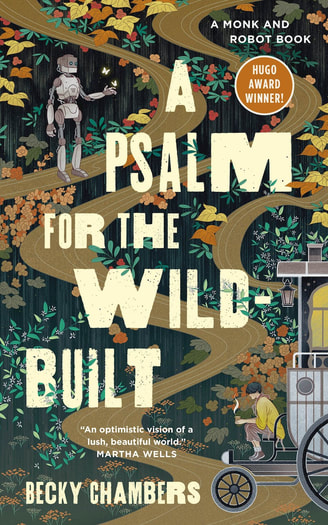
The world of Panga reinvented itself after the robots it was built upon became sentient and disappeared into the woods. Relentless metal gave way to sleek, eco-friendly buildings. Cities became less sprawling. Vast swaths of wilderness were left untouched. And robots became myth.
Dex is a tea monk searching for their purpose.
Mosscap is the first robot to be seen by a human in centuries.
And when Mosscap asks Dex, “What do people need?”, the answer may be far more complex than either of them have bargained for.
It’s rare to come across a book so thoughtful, so peaceful, and so reassuring that it feels like the literal definition of a comfort read. A Psalm for the Wild-Built, though, is one of those. This book is virtually impossible to describe and yet incredibly necessary; it feels like a warm hug, gentle and incredibly necessary, a quiet, determined insistence that the world can be better around the next corner. Chambers’s writing and world are quite simply beautiful. I’m so used to “utopian” YA novels, inevitably ending with the realization that the world isn’t actually perfect and the current regime must be overthrown, that Panga was a startling relief of a setting—one that works because instead of focusing on large-scale world and government, A Psalm for the Wild-Built zeroes in on the life of a single, incredibly ordinary person whose struggles are so incredibly universal that Dex felt utterly real to me. Their journey throughout this book is not one to save the world; it's truly one for personal fulfilment and understanding, rendered so thoughtfully and gracefully in Chambers’s peaceful and evocative prose that its universality becomes reassuring and exactly what I needed. I absolutely loved this book. I highly recommend A Psalm for the Wild-Built to readers ages twelve and up, or, in the apt words of the dedication, “anybody who could use a break.”



 RSS Feed
RSS Feed
